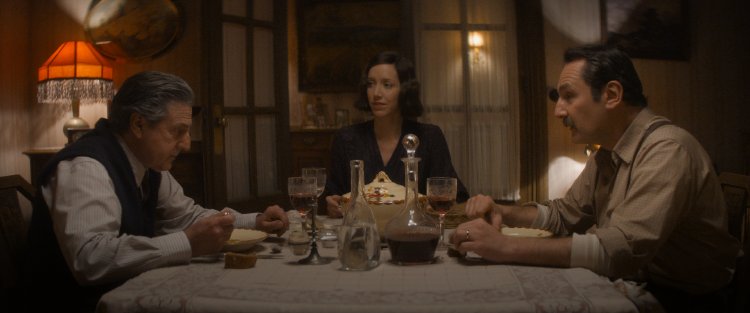Farewell, Mister Haffmann

After witnessing the craftsmanship of a jeweler (Daniel Auteuil, "Caché") who has restored a locket for a sweet, elderly Jewish couple, we see that same man watch as a Jewish census notice is pasted up on a wall outside his shop. Insisting his wife Hannah (Anne Coesens) leave immediately with their three children, he makes a deal with his employee François Mercier (Gilles Lellouche, "Smoking Causes Coughing") to buy his shop with plans of reversing the deal after the war. When he himself is unable to get out of Paris, though, he must return and hide in the cellar of his own home in “Farewell, Mister Haffmann.”
Laura's Review: B+
Adapting a play by Jean-Philippe DaGuerre, writer/director Fred Cavayé (2010's "Point Blank") gives us a surprising take on the oft-told story of a Jew being hidden during Nazi occupation. Instead of the Good Samaritan we presume François to be at the beginning of the story, we will witness a man whose failures make him susceptible to corruption. Adding to the intrigue is the third person in the household, François’s wife Blanche (Sara Giraudeau), whose initial distaste for housing Joseph Haffmann turns into empathy as the two bond in resistance to François’s blackmail of his benefactor.
Almost the entirety of the film takes place on Rue Androuet in Montmartre, the hilly, winding cobblestone street the setting of two opening shots which are repeated at film’s end, that of François’s shoes heading toward Joseph’s shop, a shot which reveals a leg brace, and, a, short while later, the figure of Joseph Haffmann laden with suitcases trudging away up the hill. Production designer Philippe Chiffre ("Tell No One") has ensured that both the street and Haffmann’s jewelry shop and the home above it look straight out of the film’s 1941 setting.
When Haffmann proposes his deal, Mercier asks why he’d trust him, Haffmann replying that the very fact that he’s asked this question deems him honorable. Haffmann gives him some cash, his stock and a promise to help Mercier buy his own shop when he returns, noting that he’s seen the man’s notebook full of his own jewelry designs. François moves his reluctant wife into the fully furnished home where she clearly feels uncomfortable, at least until she opens Hannah’s armoire and tries on a silk dress, making it awkward when Haffmann reappears.
At first François is solicitous, stating he and Blanche will move out of the bedroom, expressing that this is Joseph’s home, but Joseph retires to one of his children’s rooms. But when the smuggler who had agreed to get Joseph out of Paris reneges on the deal, things get tenser, François refusing to post Joseph’s letter to his wife, then asking the man to take his meals in the cellar. He will make two more decisions that alter everyone’s allegiances – offer to mail those letters if Joseph will try to impregnate his wife, François infertile and desperate for a child; and become the preferred jeweler of Nazi Commandant Jünger (Nikolai Kinski, Apple TV's 'Masters of the Air'), who finds the jewelry François passes off as his own exquisitely designed and crafted.
There are several tense scenes, one involving German soldiers entering the shop to retrieve a child’s ball which has rolled from the street into the shop’s cellar, all more intricate because of the psychological motivations of the three people living in what is now Mercier’s Jewelers. Cavayé teases out information, in some cases confirming our worst fears, in others restoring our faith in humanity, one instance of the former delivering the most satisfying type of ironic justice.
The cast here is exceptional, Auteuil never better as a man taking risky gambles with the deck stacked against him, Lellouche and Giraudeau completely changing our perception of their characters from film’s beginning to its end. The shifting dynamics of this triangle is what powers the film. Nikolai Kinski (son of Klaus) also plays on a balance beam of supportive encouragement and friendship mixed with potential threat. Cinematographer Denis Rouden ("36th Precinct") utilizes close-ups to emphasize the claustrophobic quarters, yet also distinguishes the different levels of the space by angling the camera upwards and downwards. Christophe Julien’s ("See You Up There") score begins with gentle piano, gradually adding violins, then evolving into the beat of a ticking clock.
“Farewell, Mister Haffmann’s” filmmakers and cast will keep you guessing until the last in this unconventional WWII psychological thriller.
Robin's Review: B
Menemsha Films released “Farewell, Mister Haffmann” in South Florida in December, 2023. It begins a run in NY on 3/29/24, expanding in subsequent weeks. Click here for theaters and playdates.

